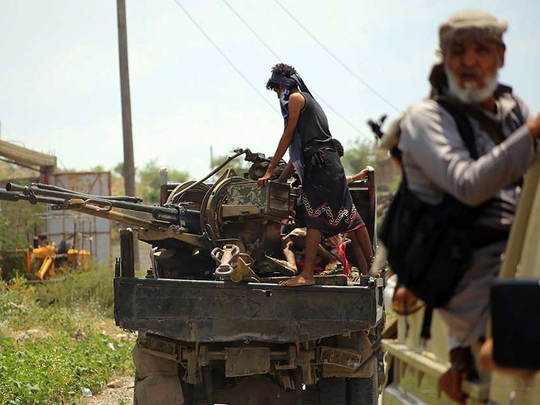
Riyadh: Top US diplomat John Kerry arrives in Saudi Arabia later on Wednesday to push for peace in Yemen after UN-brokered talks collapsed despite world concern over mounting civilian casualties.
Over two days, Kerry is to meet Saudi Foreign Minister Adel Al Jubeir as well as the foreign ministers of the rest of the Gulf states.
He will also meet UN Yemen envoy Esmail Ould Shaikh Ahmad and Britain’s Undersecretary of State for the Middle East, Tobias Ellwood.
The kingdom leads an Arab coalition that began air raids in March last year and later sent in ground forces to support Yemen’s internationally recognised government after Al Houthi rebels and their allies overran much of the country.
Peter Salisbury, associate fellow at London’s Chatham House think tank, said the Americans are limited in their ability to produce a meaningful political settlement.
He added that neither the rebels nor the government of President Abd Rabbo Mansour Hadi is willing to make the necessary concessions for a peace deal.
Seventeen months after the coalition intervened, anti-rebel forces have regained territory but Al Houthis still control most of the interior highlands and Red Sea coast.
In the southwest, government forces are battling to break a rebel siege of Taiz, Yemen’s third city.
Coalition-supported pro-government forces are also fighting Al Qaida terrorists who have exploited Yemen’s power vacuum to expand their presence in the south and southeast.
For civilians in Yemen, the Arab world’s poorest country even before the war escalated early last year, the humanitarian situation “continues to deteriorate”, the UN says.
More than 6,600 people, roughly half of them civilians, have been killed, while millions lack food, clean water and adequate health care.
Yemeni diplomatic sources said the US wants a deal on Yemen before the end of the year and will insist on the resumption of peace talks.
After making no headway, Ould Shaikh Ahmad on August 6 suspended the talks in Kuwait for one month, which triggered an escalation in fighting.
Negotiations ended after Al Houthis and forces loyal to their ally, former president Ali Abdullah Saleh, appointed a council to govern Yemen.
The move directly challenged Hadi’s government, which works from Riyadh and Yemen’s second city Aden.
The diplomatic source in Riyadh said he expected a push in Jeddah for new peace talks.
“I’m pretty sure that’s what the Saudis want as well,” the source said.
The problem is that “there’s no clear mechanism” for a way forward, he added.
Salisbury said the talks should be broadened beyond the rebels and government to include groups in the south who want its pre-1990 independence restored.
That, he said, “would send the message that peace in Yemen will be inclusive, not something agreed purely along the lines of elite interests”.
Kerry arrives from Nigeria and Kenya on a trip focused on counterterrorism.
In Saudi Arabia, he will also discuss the conflict in Syria, in which the kingdom has taken part in the US-led air strikes against the Daesh terror group, the US State Department said.












